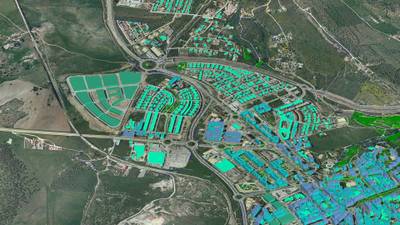Prepare for a career in the space sector with online MSc Planetary Sciences.
This flexible online degree gives you a pathway into a space industry career, whatever your academic background.
Skills for deep space exploration
Join our outstanding team online and develop the key technical skills needed for deep space exploration, including remote sensing, spectroscopy, and instrument design.
You’ll study the Earth and other objects of the solar system, such as the Moon, Mars, and exoplanets, to understand the critical steps of formation of these objects.
You’ll examine the physics of atmospheres, magnetic fields, geomorphology of the surface, isotopic differentiation, and the formation of habitable environments.
Become part of the next wave of lunar and planetary explorers.
You’ll graduate career-ready, with an informed understanding of:
- planetary atmospheres and landforms
- space environment
- remote sensing
- data analysis
- astrobiology, and
- space systems engineering and instrumentation.
Study with an exceptional team
You’ll be joining a university that is actively involved in current and future missions to Mars. We have an instrument on the NASA Curiosity rover, which is exploring Mars’ surface right now – track the rover here.
The European Space Agency’s (ESA’s) ExoMars programme is a series of missions designed to understand if life ever existed on Mars. We’re co-investigators in the ESA’s Trace Gas Orbiter, the first mission in the series, and our HABIT instrument will be part of a future ExoMars mission.
Develop skills for a range of careers
In this degree, you’ll also develop highly transferable knowledge in areas including geology, microbiology, and environmental sciences, applicable to careers outside of planetary science research.
We’re funded by the UK Space Agency
We are one of seven universities in the UK that have been funded to work towards international space science and exploration projects.
We’re working on the integration of the HABIT instrument, developed by our team to measure key conditions on Mars, in the first Japanese mission to Mars.
Join us from any discipline
Space exploration offers opportunities for everyone, regardless of your field of study.
From technological expertise and innovation to understanding the commercial, political, and legal aspects of space agencies, the sector needs interdisciplinary skills.
That’s why online MSc Planetary Sciences is open to students from any academic background.
Our curriculum and projects are designed to maximise the varied academic backgrounds of our students, fostering an environment where diverse perspectives can flourish.
By the end of this degree, you’ll be able to...
-
Discuss the fundamentals of the emergence, evolution, and future of life; the implications for life on other planets; and the relationship between life and environment.
-
Understand the fundamental physical and chemical processes in planetary atmospheres, and develop integrated histories about the nature and evolution of the planets and their atmospheres.
-
Discuss the space exploration roadmap, international space treaties, and the most challenging issues of space exploration, including sustaining a habitable environment in space, and the impact of space weather on planetary exploration.
-
Use computer algorithms including the basics of remote sensing and geospatial analysis, radiation and spectroscopy, and space radiation and weather models.
-
Develop integrated geological histories linked to internal and surficial earth processes.
-
Plan and execute the focused investigation of geological outcrops and regions.
-
Perform geospatial integration and analysis of different spatial datasets and using ArcGIS Pro, Python scripts, Spyder IDE, and the ArcPy library.
-
Engage with NASA’s Planetary Data System, ESA’s Planetary Science Archive, and online visualisation tools for data analysis and comparison.
-
Apply transferable skills including data measurement and analysis, critical thinking and reasoning, visual presentation, and communication.
What you’ll study
You’ll study the following courses that make up the 180 credits of this Masters degree.
You can also choose to exit early, earning a:
- Postgraduate Diploma (120 credits), or
- Postgraduate Certificate (60 credits).
How you’ll study
Online learning
This distance-learning MSc Planetary Sciences is delivered flexibly, 100% online.
You can learn with us anywhere, no student visa required, and manage your study hours to suit you.
Your teaching
Teaching is delivered through MyAberdeen, our online Virtual Learning Environment (VLE). It holds all the materials, tools and support you’ll need in your studies. Take a look around MyAberdeen.
You can access your learning materials on computer, smartphone and laptop, 24 hours a day. You’ll find a range of resources available, including:
- video lectures to stream or download
- online tutorials
- live online teaching sessions
- videos
- slide shows
- reading materials
- discussion boards with your tutors and peers
- the online resources of our award-winning Sir Duncan Rice Library.
Outstanding expertise
You’ll learn from teaching staff who are involved in the Planetary Protection Boards of NASA and ESA, and the Mars Sample Return Scientific Advisory Team.
Our team is currently collaborating with Oxford Nanopore Technologies on pioneering Space DNA Sequencing and is also deeply engaged in planetary sciences and astrobiology.
Your tutors
This online degree is delivered by our Department of Planetary Sciences, within the School of Geosciences.
The Department of Planetary Science is focused on the study of Earth and planetary sciences, and the development of instruments for Earth and planetary exploration.
You’ll learn from a team of internationally experienced academics, who are actively involved in multidisciplinary research in this area. Your tutors include:

Dr Miracle Israel Nazarious
Miracle is a Research Fellow in our School of Geosciences.
An inspired and passionate space engineer, he holds a bachelors in Aeronautical Engineering, dual masters in Space Technology and Instrumentation, and PhD in Atmospheric Science.
View Miracle’s profile
Dr Shaktiman Singh
Shaktiman is an environmental scientist. He teaches across the MSc GIS programme, helping students build strong technical skills and apply geospatial tools to real-world challenges.
Shaktiman’s teaching emphasises clarity, practical problem-solving, and critical thinking, preparing graduates for diverse careers.
His research focuses on climate-driven landscape change, including glacier melt, permafrost, and extreme weather, using remote sensing and spatial modelling to connect cutting-edge science with the classroom.
View Shaktiman’s profileThis degree is assessed entirely online.
We use a range of assessment methods throughout your studies, including:
- online presentations
- essays, and
- online quizzes.
Live online sessions
Each 15-credit course in this degree features two-to-four live online teaching sessions.
These are scheduled to last for around one hour.
Live session times will be organised flexibly at the start of each course. Your coordinator will consider everyone’s circumstances and time zones before setting up tutorial times.
Live sessions will also be recorded for you to view after they’ve taken place, in case you cannot attend live.
Hours for taught courses
If you plan to study part-time, we recommend you take no more than 30 credits per term. Students typically take one or two 15-credit short courses per term.
15 credits
- Around 150 hours of study and assessment time to complete.
- You’ll study 10 – 15 hours per week per term.
30 credits
- Around 300 hours of study and assessment time to complete.
- You’ll study 15 – 20 hours per week per term, plus more at assessment times.
This is an indicative guide to the time required for a typical student at this level to achieve the learning outcomes. This includes time for independent study, as well as teaching and assessments.
You can largely set your own study hours each week to cover the materials. MyAberdeen is available 24/7, so you can log in and study when it suits you.
Activities at fixed times
There will be some activities scheduled at a fixed time, such as live sessions or assessments with deadlines. But otherwise, you can access and work through each course at your convenience.
Hours for 60-credit projects and dissertations
A 60-credit project or dissertation is around 600 hours of study time.
This is around one term of full-time study.
You can dedicate a full term to your project or dissertation and work on it full-time. Or you can complete it part-time, spreading the hours you dedicate to it over two terms.
When you study with us, you can expect a first-class support structure so that you’re never alone in your studies.
But learning online does mean you have to motivate yourself and manage your own time.
Your most important commitment will be time – the time to work through, reflect on and understand your teaching materials.
Before you start a course that involves a high degree of independent study, we recommend looking at the time you will be able to devote to your studies each week:
- Be realistic
- Create a weekly schedule as a guide
If you have any questions about studying online, get in touch with our friendly team. We’re here to help.
Our first-class support structure will ensure that you aren’t alone in your studies. You’ll have contact with your coordinator via email, MyAberdeen, Microsoft Teams and WhatsApp. You can use social media and discussion boards to chat with your fellow students too.
We provide a wide range of services to support you in your studies and beyond:
- Careers and Employability Service
- Disability support
- IT support
- Library support
- Student Support Service – help with finances, wellbeing and non-academic issues
- Student Learning Service – study support, with advice sessions available
- Aberdeen University Students’ Association (AUSA) – run by students for students
- Toolkit – clever apps and free training that can make your study life easier
Wherever you are in the world, you’ll feel part of our very special Aberdeen learning community.
We’re a member of the Access scheme run by the Society of College, National and University Libraries (SCONUL).
Access study spaces, books and journals in your area
The SCONUL Access scheme allows you, as a University of Aberdeen student, to access books and resources at university libraries across the UK and Ireland, or visit them for a quiet place to study.
You’ll be able to use study spaces, books and journals at over 150 university libraries which belong to the scheme.
Your support team
Our friendly team are here to answer any queries you have about your studies.

Professor Javier Martin-Torres
Javier is the degree coordinator. He’ll be on hand to answer any questions about degree content before you start and to help you throughout your studies.

Get in touch
The online education team is here to answer any questions you have right now about this qualification, or about studying online.
Ask us a questionWhere this will take you
Your MSc Planetary Sciences qualification
You’ll graduate with a respected MSc in Planetary Sciences from the University of Aberdeen, one of the UK’s six ancient universities.
You’ll receive exactly the same degree qualification online as you would on campus. Your degree title will not mention online or distance learning.
Your MSc qualification will be recognised by employers and educational institutions around the world, opening up international career opportunities.
Careers in the space sector
The UK space industry is booming.
Findings from the UK Space Agency reveal that as of 2022, year-on-year growth of the UK space sector outpaces the wider economy by 5%.
The ‘Size and Health of the UK Space Industry 2022’ report reveals a steady growth in sector employment, with positive year-on-year growth annually since the 2011/12 year.
This degree will prepare you for a career in the space industry, as well as careers outside of planetary science research.
Wider career opportunities
Graduates from this MSc have gone on to accept graduate scientist and environmental data coordinator roles.
Through this degree, you’ll build a range of transferable skills that will help you to advance in careers within:
- energy
- public policy
- environmental consultancy
- earth resources
- teaching, and
- data analysis.
Towards a PhD and further learning
MSc Planetary Sciences also enables you to pursue further education in this subject area.
Graduates from this degree have continued on to PhD-level study.
Graduate voices
Find out what recent MSc Planetary Science graduates have to say about studying with us, and what they’re doing now.

Adam, graduated from on-campus MSc Planetary Sciences, 2023
Since graduating, Adam has secured a position as a Research Assistant at Okayama University in Japan and is currently working on his PhD.
Read about Adam’s experience
Lifelong career support
Our career support doesn’t stop when you graduate.
You have access to our free careers service while you study, and beyond.
- 1:1 appointments
- CV checks
- Interview prep
- Job opportunities
Fees and funding
Tuition fees typically increase each year. A 3% fee rise has been confirmed for academic years 2026/27, 2027/28 and 2028/29.
Our indicative costs include a 3% fee rise each year.
Pay as you go
This is a pay-as-you-go qualification.
You do not have to pay the full tuition fee upfront.
You can spread the cost and pay as you go, term by term.
How it works
- You decide how many credits to study for each term.
- At the start of term, you pay only for the credits you’re taking that term.
- This gives you control over your costs and workload for each term of your qualification.

Your personalised cost breakdown
Use the degree scheduler to plan your studies and see your cost breakdown, term by term.
Learning resources
Access to all the books and resources you need are included in your tuition fee. They’ll be made available to you online and you do not have to buy your own copies.
Printing
You may wish to set aside a small budget for printing, depending on how you like to work.
There are several ways you may be able to get help funding your studies:
- Employer sponsorship – we accept full and partial fee payments from sponsors
- Student loans
- Scholarships – search our funding database for scholarships
Find out more about funding options.
Student card
All our students are entitled to a University of Aberdeen student card. This gives you access to a range of student discounts around the city and online.
20% Alumni discount
You’re entitled to 20% off our postgraduate taught degrees and short courses if you have a degree from the University of Aberdeen. View Alumni discount details.
How discounts work
Discounts are applied during your application process. You can only use one discount per application.
Entry requirements
MSc
The minimum entry requirements for this MSc are:
- a 2:2 UK honours degree, or equivalent, in any discipline.
Space exploration offers opportunities for everyone, regardless of your field of study.
The sector needs interdisciplinary skills, and online MSc Planetary Sciences is open to students from any academic discipline.
Short course route to online MSc Planetary Sciences
If you do not meet these entry requirements, or are not ready to commit to a full MSc, you may be able to use our online short courses as a route into this degree.
Find out about our short course route to entryEntry requirements
We welcome students from all over the world.
See the minimum entry requirements above. If you do not have qualifications from the UK, check equivalent qualifications from your country.
Visa requirements
You do not need a student visa to study online with us.
English language requirements
Teaching is delivered in English.
If English is not your first language, use our English requirements checklist to see if you need to provide evidence of your English language skills when you apply.
English language tests and scores
If you do need to provide English language test scores, these are the tests and minimum scores we accept for this course or degree.
These are our Postgraduate Standard requirements.
IELTS Academic, IELTS UKVI Academic, or IELTS Online (not IELTS Indicator or IELTS General Training)
- 6.5 overall
- 5.5 for listening, reading and speaking
- 6.0 for writing
TOEFL iBT or TOEFL iBT Home Edition
- 90 overall
- 17 for listening
- 18 for reading
- 20 for speaking
- 21 for writing
- TOEFL DI code is 0818
Cambridge English: B2 First, C1 Advanced, or C2 Proficiency
- 176 overall
- 162 for listening, reading and speaking
- 169 for writing
LanguageCert Academic / LanguageCert Academic SELT
- 70 overall
- 60 for listening, reading and speaking
- 65 for writing
Oxford ELLT Digital – English Language Level Test Online
- 7.0 overall
- 5.0 for listening, reading and speaking
- 6.0 for writing
PTE Academic (online test not accepted)
- 62 overall
- 59 for listening, reading, speaking and writing
Skills for English: SELT
- B2 pass with merit
Duolingo – tests taken from 1 July 2024 onward
- 120 overall
- 95 for listening, reading and speaking
- 105 for writing
University of Aberdeen English Pre-sessional Programme (PSE)
- Pass
- Valid for one year. Refresher can be offered if out of date
Pre-sessional academic English preparation programmes undertaken at other UK universities
- Pass at an equivalent of 6.5 (C1)
- B2 in all four skills
- Certification must be within one year prior to the start of your course
For full information about language requirements, see our English Language Requirements page.
You apply through our online Applicant Portal. It allows you to upload relevant qualifications and documents.
There is no application fee for our online programmes.
What you need to apply
- Degree transcript
- Personal statement
Apply now
Start with our step-by-step guide. It explains degree transcripts, what to write in your personal statement and how to use our Applicant Portal.
You can apply to start in either September or January.
Apply as early as you can. This is so we have time to review your application and get a decision to you. We also want to ensure you have time to enrol before teaching starts.
September 2026 intake
For our September 2026 intake, the application deadline is 6 September 2026.
You will need to accept your offer and provide any outstanding documents to meet the conditions of your offer by 13 September 2026.
Teaching starts on 21 September 2026.
January 2027 intake
Teaching starts on 25 January 2027.
Application deadlines will be announced in due course.
You will need access to:
A computer (PC, laptop or Mac) with an up-to-date operating system
Most teaching materials are smartphone- and tablet-friendly. But we recommend a proper laptop or desktop for completing assignments comfortably.
Reliable internet access
We recommend:
- a wired connection
- a minimum download speed of 2 Mbps so you can take part fully in live sessions.
Speakers or headphones
- We recommend a headset with built-in microphone and earphones if you’re likely to study in an environment with background noise.
- A webcam is optional, but you may like to use one for some interactive sessions.
Software
We’ll give you access to Office365 applications. This means you can use online versions of Microsoft Word, Excel, PowerPoint and OneDrive and install these programs on up to five personal devices.
If your course requires specialist software, we’ll provide you with access to this and a licence that lasts throughout your studies.
See our detailed IT requirements for more information.
Try our degree scheduler

Choose your courses
See all the courses that are part of this degree and choose what you want to study.

Manage your study schedule
Control the pace and cost of your degree. Decide how much you want to study each term.

Save to your wishlist
Save your schedule to your wishlist so you can view and edit anytime.
Master of Science
180 credits
£16,720
This indicative cost is based on 180 credits of study over two years, starting in September 2026.
Start with a short course
£1,600
This indicative cost is based on 15 credits of study in the 2026/27 academic year.
Apply for this programme
- Start month
- September or January
- Indicative cost
- £16,720
This indicative cost is based on 180 credits of study over two years, starting in September 2026.
Apply via our Applicant Portal

